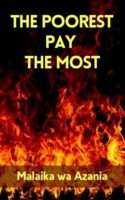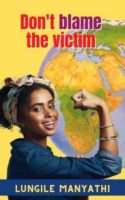A few years ago, when I was still a student at Rhodes University, I was part of the #FeesMustFall movement that was protesting against the exorbitant costs of higher education in South Africa. In a country where millions of people live below the poverty line and where the inequalities birthed by colonialism and apartheid are persistent, higher education was supposed to be the key that would unlock the chains of generational poverty for many of us. For those of us from poor working-class families, education was our only chance at escaping the dehumanising reality of poverty and hunger. But this chance was being taken from us by an education system that was so expensive that it was inaccessible to many of us and would thus see us condemned to a life of eternal suffering. And so, we took to the streets to protest our right to learn and to be given a fighting chance to escape the poverty that has defined the lives of many generations of our families and communities.
What started as a movement fighting for a noble and just cause would soon morph into something unimaginable. The #FeesMustFall protests became a site of public violence and damage to university infrastructure which in the end, would total almost a billion rand. Some of us, knowing we would be ostracised and deemed “counter-revolutionary” by those who insisted that this tactic would bear fruit, condemned the violence. I wrote numerous articles about the violence, arguing that it would take us ten steps backwards because the infrastructure that we were destroying would be needed to ensure the quality free education that we were fighting for. I was vindicated when, in 2018, the report on the extent of damage to university infrastructure was released. As I had argued, it was mainly historically Black universities that were already underdeveloped that suffered significantly. The wealthier universities suffered less destruction and could thus direct their resources towards greater development while the poorer ones would have to rebuild what was vandalised.
It is with the same sense of heartbreak and pain that I watch the ongoing public violence and looting that is happening across the country. The violence is a response to the arrest of former President Jacob Zuma who was convicted of contempt of court by the Constitutional Court. What began as a protest against his incarceration has become a spree of nationwide looting and vandalism of infrastructure including malls, factories, roads and trucks. In just four days, at least 45 people have been killed in the Gauteng and KwaZulu Natal provinces – the two most populous provinces in the country. As the violence continues, the numbers are guaranteed to rise, especially since private citizens are now arming themselves to protect their properties. Because these are not people who are trained to deal with crowd control like the police are and are on their own due to law enforcement being overwhelmed, they will likely shoot indiscriminately at anyone they even suspect of having intentions of looting.
The ongoing violence has one thing in common with the #FeesMustFall protests: at the end of it all, those who will suffer most from it are the poorest of the poor. If you follow the news closely, you will realise that townships and downtown CBDs are the areas most affected by the violence. These are areas where poor people live and work. In townships where unemployment is higher, the looting of shops will see scores of people lose their jobs as shop-owners try to recover the lost revenue or spend months rebuilding the burnt buildings. Some of these stores will shut down permanently. A warehouse that was burnt down in Durban suffered losses amounting to R250 million. The owner has indicated that he is going to have to close down the business, resulting in the loss of 600 jobs. Most of those employed in these stores are Black people who have families and extended relatives to take care of. The consequences of them being unemployed are unthinkable.
But the cost of this public violence will not only be felt in the economy through the loss of jobs and investors not wanting to bring their resources to an unstable country, it is also the inevitable loss of lives that will follow. We are in the midst of a devastating global pandemic that has claimed the lives of almost 65 000 people. The ongoing violence has forced the closure of more than 100 vaccination sites at a time when less than 10 percent of our population has been vaccinated. The closure of these sites means the virus will spread quicker and lead to more hospitalisations and deaths. And with ambulances also burnt and vandalised by the protesters, people will certainly die in their homes. The looting sprees are also super-spreaders, so in the coming few days, we are going to see the number of infections increase exponentially. This is the human cost of public violence and looting.
I have no doubt that at the heart of this violence is the sense of dejection about a myriad of other socio-economic and political issues beyond the arrest of the former president. The unemployment rate is high, poverty is rife, hunger is widespread and inequalities abound. To protest against this is reasonable. But to do so by destroying the very infrastructure that sustains livelihoods and offers some relief, and to do so by putting lives of innocent people at risk, is to shoot ourselves in the foot. It is our family members who will lose jobs and our relatives who will starve. It is our communities that will be perpetually underdeveloped and thus be unable to leverage on investments that could re-write the narrative of poverty. The rich will not have to drive on roads with pot-holes or go to clinics that have been vandalised. They will not be deprived of vaccines that will save their lives against the devastating pandemic. It is the poor who will pay the price because public violence and looting affects and dehumanises the poor. For this reason alone, we must refuse to be part of the looting and violence. It is our moral obligation.
***
Malaika Mahlatsi (Wa Azania)is an award-winning columnist and the bestselling author of Memoirs of a Born Free: Reflections on the Rainbow Nation and Corridors of Death: The Struggle to Exist in Historically White Institutions. She was voted as one of the 50 Most Powerful Women of South Africa by the Mail & Guardian in 2020.



